Birth and Childhood
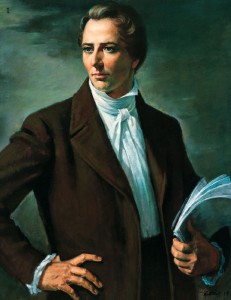 Joseph Smith, Jr. was born on December 23, 1805, in Sharon, Vermont. He was the fifth child (including an unnamed son who died at birth in 1797), of eleven children born to Joseph Smith Sr. (1771–1848) and Lucy Mack (1775–1856). Of those eleven children, nine survived to adulthood. Of the surviving nine, there were six boys and three girls: Alvin, Hyrum, Sophronia, Joseph, Samuel Harrison, William, Katharine, Don Carlos, and Lucy.
Joseph Smith, Jr. was born on December 23, 1805, in Sharon, Vermont. He was the fifth child (including an unnamed son who died at birth in 1797), of eleven children born to Joseph Smith Sr. (1771–1848) and Lucy Mack (1775–1856). Of those eleven children, nine survived to adulthood. Of the surviving nine, there were six boys and three girls: Alvin, Hyrum, Sophronia, Joseph, Samuel Harrison, William, Katharine, Don Carlos, and Lucy.
Early on, the Smith family, due to their extreme poverty, was forced to move, first to New Hampshire in 1811, and then to Palmyra, New York, in 1816, when Joseph was about ten years old. While in Vermont, the family lost much of their money trying to become Ginseng traders, when the middleman they had selected ran off with their earnings. This forced the family to continue the hard-scrabble life of farming, which they did by purchasing some uncleared land just south of Palmyra. Of Joseph’s early life, his mother, Lucy, remarked that he seemed a very ordinary boy accustomed to hard work and deep meditation, but not inclined to reading much.
Typhoid Fever
A remarkable incident in his childhood occurred while the family was living in Lebanon, New Hampshire, in 1811, when Joseph, among many others, contracted typhoid fever. (More than 6,000 died in this epidemic regionally.) The fever cleared, but the infection eventually settled in his leg. Joseph’s brother Hyrum spent weeks holding the swollen leg to relieve the pressure until a doctor could be found to treat it. Fortunately for the family, Dartmouth Medical College was nearby, and several prominent physicians came to treat Joseph. They recommended amputation, but Lucy, Joseph’s mother, refused to allow it, knowing what life on the frontier for an amputee would mean. Instead, Dr. Nathan Smith proposed to open the leg and cut out the infected portions. Young Joseph, then only about seven years of age, demanded that his mother leave the house and that his father hold him during the operation. Joseph refused to take whisky, the only form of anesthesia available in those days, and bore the pain. He nearly died in the operation, losing an immense amount of blood, but over the next few months, he recovered and retained only a slight limp for the rest of his life, though he had to walk on crutches for many months during his recovery. For a time, Joseph was sent to live with an uncle in Salem, Massachusetts, in hopes that the fresh sea air would help him heal faster. The incident took any surplus money had by the Smith family. The family had only been able to afford formal education for their children for a few years before this setback.
Joseph Smith’s Family and Religion
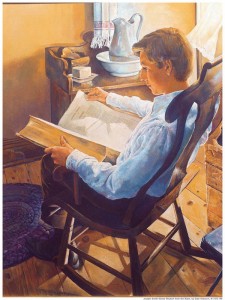 Joseph Smith’s family was religious, but in general refrained from committing to a single denomination, as was common among frontier people in those days. The family regularly read the Bible together, prayed together, and were deeply concerned with the welfare of their souls. This affected young Joseph Smith as well, and he later recalled that he would frequently stare up at the stars and ponder about God and his own salvation. He said that he desired to “get religion” and be saved, but could not get the feeling as others did. In 1816 and 1817, when Joseph was 12, a revival swept upper state New York, as part of what has been called the Second Great Awakening. This caused him great concern, and
Joseph Smith’s family was religious, but in general refrained from committing to a single denomination, as was common among frontier people in those days. The family regularly read the Bible together, prayed together, and were deeply concerned with the welfare of their souls. This affected young Joseph Smith as well, and he later recalled that he would frequently stare up at the stars and ponder about God and his own salvation. He said that he desired to “get religion” and be saved, but could not get the feeling as others did. In 1816 and 1817, when Joseph was 12, a revival swept upper state New York, as part of what has been called the Second Great Awakening. This caused him great concern, and
Daily necessity meant, however, that Joseph Smith had no time for regular schooling or even home study. He read from the Bible, but only had a few days of formal schooling, though his parents taught him basic reading and arithmetic. The poverty of the family meant that the older boys, Joseph included, hired themselves out as day-laborers to neighboring farmers, and Joseph Smith Sr. occasionally ran a stand selling food and alcohol in town. The boys were known for their hard work and industry, as can also be seen in the many acres they cleared on their property and the frame house they built. Toward the end of the decade and into early 1820, Joseph described being even more agitated about religion and determined to find an answer.he became worried that he would not be saved. Though the fervor of the revival ebbed in 1817, young Joseph’s feelings did not. He continued to pray and ponder about what he should do. His family became divided as well, with his mother and some of his siblings joining the Presbyterian Church, while his father remained aloof. Devoted to his father, Joseph remained at home with him, while the rest of the family attended church. Over time, young Joseph became partial to the Methodist Church and even joined a debating club for young boys at that church.
The First Vision
Joseph Smith, 14 years old in the spring of 1820, had discovered while attending the various meetings of the different churches in Palmyra, that there was great confusion between the denominations about many basic issues. He said:
How to act I did not know, and unless I could get more wisdom than I then had, I would never know; for the teachers of religion of the different sects understood the same passages of scripture so differently as to destroy all confidence in settling the question by an appeal to the Bible (Joseph Smith—History 1:12).
Later he came across a passage in the epistle of James 1:5: “If any of you lack wisdom, let him ask of God, that giveth to all men liberally, and upbraideth not; and it shall be given him.” Joseph Smith said that as he read this passage, “It seemed to enter with great force into every feeling of my heart. I reflected on it again and again, knowing that if any person needed wisdom from God, I did” (JS—H 1:12).
He concluded that, just as James had directed, he could ask of God concerning what he should do. Joseph Smith wanted to know the truth. Joseph and his family lived in an environment of faith, and though not everyone on the frontier was a church member, most were religious and believed in God and in the occurrence of miracles. Belief in folk magic was also strong, and while Joseph Smith and his family believed in some of these superstitions, ultimately Joseph Smith would reject superstition in favor of a belief in the power of God. Joseph Smith’s faith in God was strong, and he went one day early in the spring of 1820, to a grove of trees on the family’s property to pray to God in order to know which church he should join and how he could obtain forgiveness of his sins, which troubled him.
What happened can best be told in Joseph Smith’s own words:
After I had retired to the place where I had previously designed to go, having looked around me, and finding myself alone, I kneeled down and began to offer up the desires of my heart to God. I had scarcely done so, when immediately I was seized upon by some power which entirely overcame me, and had such an astonishing influence over me as to bind my tongue so that I could not speak. Thick darkness gathered around me, and it seemed to me for a time as if I were doomed to sudden destruction.
But, exerting all my powers to call upon God to deliver me out of the power of this enemy which had seized upon me, and at the very moment when I was ready to sink into despair and abandon myself to destruction—not to an imaginary ruin, but to the power of some actual being from the unseen world, who had such marvelous power as I had never before felt in any being—just at this moment of great alarm, I saw a pillar of light exactly over my head, above the brightness of the sun, which descended gradually until it fell upon me. It no sooner appeared than I found myself delivered from the enemy which held me bound. When the light rested upon me I saw two Personages, whose brightness and glory defy all description, standing above me in the air. One of them spake unto me, calling me by name and said, pointing to the other—This is My Beloved Son. Hear Him!
My object in going to inquire of the Lord was to know which of all the sects was right, that I might know which to join. No sooner, therefore, did I get possession of myself, so as to be able to speak, than I asked the Personages who stood above me in the light, which of all the sects was right (for at this time it had never entered into my heart that all were wrong)—and which I should join. I was answered that I must join none of them, for they were all wrong; and the Personage who addressed me said that all their creeds were an abomination in his sight; that those professors were all corrupt; that: “they draw near to me with their lips, but their hearts are far from me, they teach for doctrines the commandments of men, having a form of godliness, but they deny the power thereof.” He again forbade me to join with any of them; and many other things did he say unto me, which I cannot write at this time.
When I came to myself again, I found myself lying on my back, looking up into heaven. When the light had departed, I had no strength; but soon recovering in some degree, I went home (JS—H 1:15–20).
Joseph returned home and at first kept the vision a secret, telling his family only that he had discovered by himself that he should not join any of the available churches, though he continued to attend some of their meetings and discuss matters of religion with some of the local ministers. Members of The Church of Jesus Christ of Latter-day Saints (often misnamed “Mormons”) today call this event the First Vision. It marks the beginning of Joseph Smith’s prophetic and revelatory mission.
As Joseph began sharing this sacred experience with others, it stirred up much controversy in the community and led to some ostracism and harassment of the young boy. Ministers warned people to stay away from him and said that the vision was from the devil, since God no longer worked by revelation.
Joseph said:
It caused me serious reflection then, and often has since, how very strange it was that an obscure boy, of a little over fourteen years of age, and one, too, who was doomed to the necessity of obtaining a scanty maintenance by his daily labor, should be thought a character of sufficient importance to attract the attention of the great ones of the most popular sects of the day, and in a manner to create in them a spirit of the most bitter persecution and reviling. But strange or not, so it was, and it was often the cause of great sorrow to myself. (JS—H 1:23).
The Visit of the Angel Moroni
For the next few years, Joseph Smith and his family faced much prejudice and even persecution in their community, and some people refused to hire any member of the family for day labor. This caused some hardship financially, as production from the family farm was not yet sufficient to support them. Worse still, in November of 1823, Alvin Smith, the oldest son and one of the most important workers in the family, died. This was a tragic blow to the family as a whole and to Joseph Smith especially, who greatly admired and loved his brother.
Around the time of Alvin’s death, Joseph grew worried about the state of his own soul. He had had a glorious vision some three years before, but since that time, he felt that he had grown distant from God, and that the company he kept was not wholesome enough, especially since he had been ostracized by many in town and had instead kept company with some of the rougher characters in the area. He later said that while he committed no “great or malignant sins,” he was guilty of “levity, and sometimes associated with jovial company, etc., not consistent with that character which ought to be maintained by one who was called of God” (JSH 1:28).
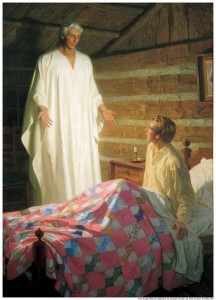 On the night of November 21, 1823, Joseph knelt to pray in his room. As he prayed, a light appeared above him beside the bed. A figure appeared, dressed in a white robe, standing in the air next to Joseph’s bed. The being, an angel sent from God, gave his name as Moroni and said that he had been sent to call Joseph Smith to be a prophet of God and to complete a mission for God. He told Joseph that a book, written on metal plates, was deposited in a hill near Palmyra. This record contained the fulness of the Gospel of Jesus Christ as God’s prophets had taught it to some ancient inhabitants of the American continent. Moroni also told Joseph many things about the work he was called to perform, much of which Joseph could scarcely understand at the time. As Moroni completed the message, he disappeared from Joseph’s view.
On the night of November 21, 1823, Joseph knelt to pray in his room. As he prayed, a light appeared above him beside the bed. A figure appeared, dressed in a white robe, standing in the air next to Joseph’s bed. The being, an angel sent from God, gave his name as Moroni and said that he had been sent to call Joseph Smith to be a prophet of God and to complete a mission for God. He told Joseph that a book, written on metal plates, was deposited in a hill near Palmyra. This record contained the fulness of the Gospel of Jesus Christ as God’s prophets had taught it to some ancient inhabitants of the American continent. Moroni also told Joseph many things about the work he was called to perform, much of which Joseph could scarcely understand at the time. As Moroni completed the message, he disappeared from Joseph’s view.
Twice more that night the angel appeared to Joseph Smith and repeated the same message, each time adding something more. He counseled Joseph to be faithful and not to try to use the record for material gain; neither to show it to anyone except those whom God would appoint. After the third visit, the angel ascended into heaven and the sun came up. Joseph immediately got out of bed and prepared to do his daily chores, but his strength was too far gone. His father, noticing his son was not feeling well, told Joseph to go home, but as Joseph crossed the fence that led out of the fields, he fell. When he awoke he saw the angel again standing above him. The angel told Joseph to go tell his father about the visions. Joseph did so, and his father, after some reflection, declared that the visions truly came from God and told Joseph to go to hill as the angel had instructed.
Guided by the vision of the hill he had seen in his mind, Joseph quickly found the spot where the records were deposited. He cleared away the dirt around a large stone which marked the spot, and opened up the box containing the records and other sacred items. The angel reappeared and told him that the time had not come for him to remove the records, and that he had much to learn before he would be ready to open the record and translate it. The angel told him to return to that spot every year on the 22 of September until that time was right.
Treasure Digging and Marriage
Over the next few years, Joseph returned to the hill every year on the same date, each time receiving more instruction from the angel Moroni. During the rest of the year, however, he continued to work hard both on the family farm and by hiring himself out as a laborer. He continued to be harassed and mocked by the town people because of his visions, but his family stuck by him, knowing that he was always truthful.
In 1825, a man named Josiah Stowell (also spelled Stoal) hired Joseph to help him search for buried treasure. The region of upper state New York was full of legends about buried Spanish or pirate treasure. Stowell had sought out Joseph because of the rumors about his ability to find hidden things, as the stories about his visions of the angel Moroni and buried golden plates indicated. Joseph was also known for an uncanny ability to find water when digging wells. Though treasure-digging was not as honorable a profession as farming or running a store, it was widely practiced in the region in which Joseph was raised. According to Joseph Smith, the angel Moroni later commanded him to stay away from money diggers and the whole treasure seeking business, because these were greedy wicked persons and Joseph was called to a higher work. After this 1825 excursion with Stowell, Joseph never again associated with the money-diggers.
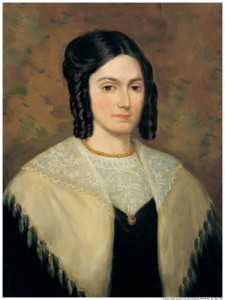 Nevertheless, Joseph and his father needed money for the family, and so they hired themselves out to Stowell late in 1825 to search for Spanish treasure in Harmony, Pennsylvania. After one month of fruitless digging, Joseph Smith Sr. and his son convinced Stowell to give up the venture. The expedition was not altogether worthless, for while digging, Joseph stayed with the Hale family where he met their beautiful, well-educated daughter Emma, whom he married in January 1827. Unfortunately, in the interim, some of Stowell’s relatives felt cheated and took Joseph Smith to trial in 1826 for disturbing the peace and “glass looking.” In the hearing, Stowell defended Joseph Smith, declaring him a capable and hard-working boy; for his part, Joseph said he hated looking for treasure, but needed the work. No official trial was ever undertaken, merely a hearing before a judge as witnesses were examined to determine if a trial was warranted. Ultimately, Joseph was released and continued working in the area both for Stowell and at various mills. Shortly after he married Emma Hale in early 1827, the newlyweds returned to Palmyra where they lived with Joseph’s parents.
Nevertheless, Joseph and his father needed money for the family, and so they hired themselves out to Stowell late in 1825 to search for Spanish treasure in Harmony, Pennsylvania. After one month of fruitless digging, Joseph Smith Sr. and his son convinced Stowell to give up the venture. The expedition was not altogether worthless, for while digging, Joseph stayed with the Hale family where he met their beautiful, well-educated daughter Emma, whom he married in January 1827. Unfortunately, in the interim, some of Stowell’s relatives felt cheated and took Joseph Smith to trial in 1826 for disturbing the peace and “glass looking.” In the hearing, Stowell defended Joseph Smith, declaring him a capable and hard-working boy; for his part, Joseph said he hated looking for treasure, but needed the work. No official trial was ever undertaken, merely a hearing before a judge as witnesses were examined to determine if a trial was warranted. Ultimately, Joseph was released and continued working in the area both for Stowell and at various mills. Shortly after he married Emma Hale in early 1827, the newlyweds returned to Palmyra where they lived with Joseph’s parents.
Joseph’s Life as a Prophet
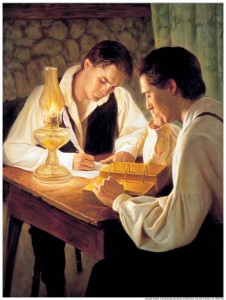 Over the next three years, Joseph translated the record he was finally able to retrieve from the hill. This work was published as the Book of Mormon in 1830. On April 6, 1830, Joseph organized The Church of Jesus Christ of Latter-day Saints, as directed by God. Joseph had been given the priesthood, the power and authority to act in God’s name, by John the Baptist and
Over the next three years, Joseph translated the record he was finally able to retrieve from the hill. This work was published as the Book of Mormon in 1830. On April 6, 1830, Joseph organized The Church of Jesus Christ of Latter-day Saints, as directed by God. Joseph had been given the priesthood, the power and authority to act in God’s name, by John the Baptist and
Peter, James, and John, who appeared to him. Joseph spent the rest of his life leading the Church God had called him to organize. This period is dealt with more in-depth in the Book of Mormon and Organization of the Church.
It is difficult to write about Joseph Smith’s life separate from his involvement in The Church of Jesus Christ of Latter-day Saints, because it became his life in every way. Every moment he had was devoted to building the kingdom of God on the earth, which involved the organization of the Church.
Personal events are in The Timeline of Joseph Smith’s Life and a more in-depth history of the Church is the main focus of this website. Suffice it to say, the rest of Joseph’s life was spent in building and defending the Church. Joseph constantly dealt with persecution, both personal and of the Church and its members, false accusations, and wrongful imprisonments. Those who had once been his friends betrayed him and tried to damage his reputation. Prejudices and misunderstandings led mobs to attack the Saints again and again, driving them from their own homes and communities. Members of the Church were pushed out of New York, Ohio, Missouri, Illinois, and finally they left the country seeking peace. They settled in the Salt Lake Valley, which almost immediately after their leaving Illinois became the Utah Territory, and they were once again part of the United States. They retreated to a desert no one wanted and made it blossom as a rose.
Joseph Smith Martyrdom
Before their final retreat, though, animosity had reached a peak in their beautiful city of Nauvoo, Illinois, which they had built out of a swamp. They had left many communities, often at great personal cost, and had found temporary peace in this place. They built a beautiful temple in Nauvoo, following God’s command to do so, but Joseph Smith was destined to never be left alone.
Mobs surrounded the Nauvoo Temple and threatened to burn Joseph’s house. One local newspaper said that within 10 days, they would murder or expel all Mormons from Nauvoo. After an incident where Joseph had been involved in legally destroying the printing press of the Nauvoo Expositor, which had printed several false and vilifying things about the Saints, even more people wanted Joseph’s blood.
Joseph Smith appealed to U.S. President John Tyler and Illinois Governor Thomas Ford for protection from mob violence. The Nauvoo Legion was called up and martial law was declared in Nauvoo in order to protect the citizens. On June 21, 1844, Governor Ford arrived. He calmed the populations of Carthage and Nauvoo and quickly dismissed the rumors about Mormons attacking others, but he determined that Joseph Smith should at least stand trial for the destruction of the Nauvoo Expositor. He argued that the destruction itself was not necessarily illegal, but that due process had not been followed in both of Joseph’s acquittals. Ford promised Joseph Smith the protection of the state militia and his own personal oversight to ensure that due legal procedure would be followed. Joseph Smith did not trust the proposal, and for a few hours attempted to flee to Iowa, but his brother, Hyrum Smith, and his friends persuaded him to return. On June 25, 1844, Joseph Smith surrendered and was imprisoned in Carthage Jail. As he rode to Carthage, Joseph declared, “I am going like a lamb to the slaughter; but I am calm as a summer’s morning; I have a conscience void of offense towards God, and towards all men. I SHALL DIE INNOCENT, AND IT SHALL YET BE SAID OF ME—HE WAS MURDERED IN COLD BLOOD” (Doctrine and Covenants 135:4, emphasis in original).
Carthage, Illinois, was the center of much of the opposition to the Church, and Joseph would certainly not have been given a fair trial there, but Ford admitted that he made this demand in order to placate the masses (History of the Church 6:536).
The Governor promised a quick and fair trial and also promised the protection of an impartial state militia in Carthage. Joseph was quickly released on bail and then immediately rearrested for treason for declaring martial law in Nauvoo. On June 26, Governor Ford went to Nauvoo to assuage the Saints’ fears, but instead of leaving the state militia in charge in Carthage, Ford left the local militia (called the Carthage Greys) as protectors of the very man they had sworn to kill.
Many friends had accompanied Joseph Smith to Carthage Jail and remained in prison with him, though they were not under arrest. On June 26, Joseph Smith ordered them to leave. He promised one friend, a convert from Wales named Dan Jones, that Jones would escape the mobs and return to Wales as a missionary. This came true several years later, and Dan Jones became one of the greatest missionaries in Mormon history. All but three friends eventually left. The three that remained at Carthage were Joseph’s brother, Hyrum, John Taylor, who later became President of the Church, and Willard Richards, an Apostle. Most of the other Apostles, including Brigham Young, had recently been sent on missions to the east coast of the United States.
On June 27, Joseph, Hyrum, Willard, and John were permitted by the jailor to move from the cells into a more comfortable bedroom. Joseph Smith spent the day reading from the Book of Mormon and writing letters to his family. At age 38, Joseph Smith had had 11 children born to him through Emma. Six of those died in infancy. In Ohio, Emma had lost twins, but then shortly after adopted twins from a family whose own mother had died. Only five children survived to adulthood: Julia Murdock (one of the adopted twins), Joseph Smith III, Frederick, Alexander, and David Hyrum (who was born after Joseph’s death). Julia, the oldest, was only 13 when her father died and Joseph, the oldest son was only 12. In his letters, Joseph Smith pleaded with Emma to raise the children in the Lord and to follow the religion their father had taught. He was also concerned about the ill-health of his Mother, now widowed for three years and who could scarcely take care of herself anymore.
On the afternoon of June 27, 1844, Joseph, Hyrum, Willard, and John took turns reading aloud from the scriptures and from the writings of the Jewish historian Josephus. According to John Taylor, the last passage of scripture that Hyrum Smith read was in Ether 12 in which Moroni, the last Book of Mormon prophet, bids farewell to those who oppose God’s work. John Taylor also sang Joseph Smith’s favorite hymn, “A Poor Wayfaring Man of Grief,” which describes the friendship between a righteous man and a poor man, who suffers much from trials and false imprisonment and is revealed to be the Savior in disguise.
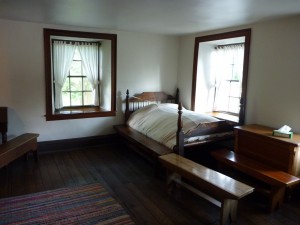 Around 5:00 p.m., shots sounded outside the jail, and the jailers and guards fled before a huge mob of men, mostly members of the Carthage Greys, whom Governor Ford had placed in charge of protecting Joseph Smith. Their faces were obscured by black pitch, and they burst into the jail firing their guns. The mob burst in and the surrounded and outmanned prisoners tried to defend themselves. Hyrum and Willard Richards attempted to brace the door, but a bullet penetrated the wood, hitting Hyrum in the face. He fell to the floor shouting “I am a dead man.” Joseph cradled his dying brother, exclaiming, “Oh! my poor, dear brother Hyrum!”
Around 5:00 p.m., shots sounded outside the jail, and the jailers and guards fled before a huge mob of men, mostly members of the Carthage Greys, whom Governor Ford had placed in charge of protecting Joseph Smith. Their faces were obscured by black pitch, and they burst into the jail firing their guns. The mob burst in and the surrounded and outmanned prisoners tried to defend themselves. Hyrum and Willard Richards attempted to brace the door, but a bullet penetrated the wood, hitting Hyrum in the face. He fell to the floor shouting “I am a dead man.” Joseph cradled his dying brother, exclaiming, “Oh! my poor, dear brother Hyrum!”
According to John Taylor, Joseph then “instantly arose and with a firm, quick step, and a determined expression of countenance, approached the door, and pulling the six-shooter left by Brother Wheelock from his pocket, opened the door slightly, and snapped the pistol six successive times; only three of the barrels, however, were discharged” (Hyrum Smith: A Life of Integrity, Jeffrey S. O’Driscoll, 352).
As bullets flew through the room around him, Joseph ran to the window. John Taylor was shot four times, and only his pocket watch preserved his life, catching a bullet that would have killed him. He crawled under a bed for protection. Willard Richards watched as Joseph climbed onto the window sill. Immediately he was struck twice from behind and once from the window. Four bullets hit him and he fell out of the window exclaiming, “O Lord, My God!” He landed at the foot of a well just outside the jail and was shot numerous times more until someone in the crowd shouted, “The Mormon militia is coming,” thus sparing his body from further desecration. The Mormons were not really coming, but the rumor was enough to scatter the mob. Willard Richards patched up John Taylor’s wounds with straw and cloth and tended to the bodies of Joseph and Hyrum.
That day Samuel Harrison Smith, the prophet’s brother, was riding to Carthage. As he neared and discovered the mob activity, he raced back to Nauvoo to tell the Mormons there and to get help. The exertion was too much for him, and a few weeks later he, too, died, leaving only one of the six Smith brothers, the unstable William Smith, to outlive their mother. All three of Joseph’s sisters, Sophronia, Katharine, and Lucy, survived and lived full lives. Joseph’s mother lived until 1856 in the care of Emma Smith, but for most of that time she was an invalid.
The bodies of Joseph and Hyrum Smith were returned to Nauvoo, Illinois, the next day and buried in a secret location near Joseph’s home on June 29, 1844, since a price was placed on his body. Only a few knew the location. A public burial with coffins full of sand was also held.
The Aftermath of the Martyrdom
Joseph Smith had declared that he would die to help save the Mormons and The Church of Jesus Christ of Latter-day Saints. This prophecy was fulfilled as the Mormons’ many enemies waited following the murder of Joseph and Hyrum believing that the “Mormon Church” would disintegrate without its leader, but these enemies misunderstood Joseph Smith and the Mormons. They believed that Mormonism was a cult with Joseph Smith as the Mormons’ God and that without him, Mormonism would crumble.
But the “Mormon Church” did not crumble, because it is The Church of Jesus Christ, and its teachings are founded not in a fallible prophet, but in an infallible God who inspires His prophets. Mormonism continued to thrive, and in the brief respite following the martyrdom, the Mormons finished their beautiful temple and prepared to abandon Nauvoo, which they named the City of Joseph. The leadership of the Mormon Church was assumed by the Quorum of the Twelve Apostles with Brigham Young as senior Apostle. Before his death, Joseph had conferred all the priesthood keys he held as a prophet upon the Twelve. Shortly after Joseph’s death, the import of this act became clear to the apostles.
In early 1846, the Saints completed the Temple, and the members received their temple endowments, and many were sealed for time and eternity as families. Late in 1846, the residents of Carthage and Warsaw demanded that the Mormons leave, and Brigham Young began the preparation to yet again abandon everything and move. The first Mormons pioneers had begun their exodus in 1845, but the main party began leaving in February of 1846. They fled into the muddy lands of Iowa. In September of 1846, the last Mormons were expelled by the Carthage militia in the Battle of Nauvoo. During the expulsion, arsonists desecrated and burned the Nauvoo Temple, and a few years later a tornado destroyed what remained. The great Mormon Pioneer Exodus to Utah had begun.
Joseph Smith’s Legacy
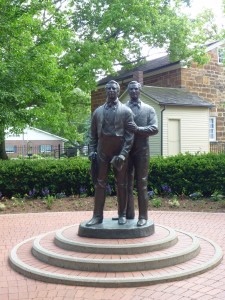 The organizational structure Joseph Smith left behind has remained largely unchanged in the subsequent 200 years, only with small procedural changes and numerous expansions. Most importantly, he restored and taught the fullness of the Gospel of Jesus Christ and organized the Mormon missionary force that continues to this day in preaching God’s message to the entire world. Joseph’s inspired words, like those of ancient prophets Isaiah and Paul, have become scripture, but beyond that, Joseph’s testimony and example about how to come closer to God and how to obtain salvation have helped millions to find peace in this life and salvation in the life to come.n 38 years, Joseph Smith accomplished more than most men do in much longer lifetimes. He translated the Book of Mormon and oversaw its publication on two continents. He received and published many revelations of his own in what became known as the Doctrine and Covenants. He organized The Church of Jesus Christ of Latter-day Saints (often mistakenly referred to as the “Mormon Church”) and gathered together thousands of people, built numerous cities and two beautiful temples. He taught Mormon beliefs about the Gospel of Jesus Christ, of whom he had a sure witness, and helped men realize their divine worth and potential in God’s eyes. As president of the Church, Joseph sent missionaries to three continents (North America, Europe, and parts of Asia), and through their efforts, more than 25,000 people joined themselves to the Church and sacrificed nearly everything to join the Saints.
The organizational structure Joseph Smith left behind has remained largely unchanged in the subsequent 200 years, only with small procedural changes and numerous expansions. Most importantly, he restored and taught the fullness of the Gospel of Jesus Christ and organized the Mormon missionary force that continues to this day in preaching God’s message to the entire world. Joseph’s inspired words, like those of ancient prophets Isaiah and Paul, have become scripture, but beyond that, Joseph’s testimony and example about how to come closer to God and how to obtain salvation have helped millions to find peace in this life and salvation in the life to come.n 38 years, Joseph Smith accomplished more than most men do in much longer lifetimes. He translated the Book of Mormon and oversaw its publication on two continents. He received and published many revelations of his own in what became known as the Doctrine and Covenants. He organized The Church of Jesus Christ of Latter-day Saints (often mistakenly referred to as the “Mormon Church”) and gathered together thousands of people, built numerous cities and two beautiful temples. He taught Mormon beliefs about the Gospel of Jesus Christ, of whom he had a sure witness, and helped men realize their divine worth and potential in God’s eyes. As president of the Church, Joseph sent missionaries to three continents (North America, Europe, and parts of Asia), and through their efforts, more than 25,000 people joined themselves to the Church and sacrificed nearly everything to join the Saints.
Joseph Smith wrote to a newspaper editor in Chicago, when asked about the Church’s basic beliefs, and he said this about the future of Mormonism:
Our missionaries are going forth to different nations . . . the Standard of Truth has been erected; no unhallowed hand can stop the work from progressing; persecutions may rage, mobs may combine, armies may assemble, calumny may defame, but the truth of God will go forth boldly, nobly, and independent, till it has penetrated every continent, visited every clime, swept every country, and sounded in every ear, till the purposes of God shall be accomplished, and the Great Jehovah shall say the work is done. (History of the Church 4:540)

 Watch a video about the restoration of the gospel on lds.org
Watch a video about the restoration of the gospel on lds.org